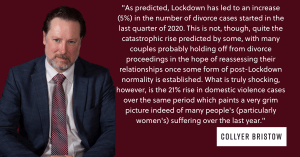- Family and divorce

Longer Reads
Kim vs Kanye: Will the terms of their prenup be upheld if they divorce?
If the rumours are true Kim Kardashian and Kanye West are divorcing. Both have accumulated vast wealth during the marriage, but what would have happened if only one of them had increased their wealth very significantly? Will the original prenup, in favour of Kim, be upheld now Kanye is reportedly worth more?
3 minute read
Published 28 January 2021
Key information
- Specialisms
- Private Wealth
- Services
- Family and divorce
If the rumours are true Kim Kardashian and Kanye West have now “completely stopped marriage counselling” and their nearly seven-year marriage is sadly heading to the divorce courts. While some may feel that two lucky Californian attorneys are about to hit the jackpot, the reality is almost certainly somewhat different as both Kim and Kanye are, of course, both hugely wealthy in their own right (he is said to be worth $1.2 billion by Forbes while her fortune is a mere $900 million) and have income streams that would make a small developing country envious.
Accordingly, other than deciding how to divide the bling, the chances of Kim going after a slice of Kanye’s wealth is probably small. The other reason is, of course, that this being California, it is likely that they had a prenup as Kim was worth $45 million when they married whereas Kanye was said to be worth a mere $30 million. The prenup is likely to have prevented claims either way, which maybe something that Kim is now regretting given that Kanye has been claiming recently that his wealth is actually in excess of $3 billion.
So what if anything can ordinary UK based mortals learn from this tale? Well, one interesting question this throws up is what would have happened if only one of them had increased their wealth very significantly – which is probably a more usual scenario?
In California the terms of the prenup would almost certainly have prevailed since such agreements are recognised by state law. Had they been subject to English law, however, the position would have been much less straightforward.
Under English law there is currently no statutory recognition of prenuptial contracts and plans for such recognition (set out most recently by the Law Commission back when Kim and Kanye were tying the knot in 2014) are very much in the legislative long grass filed under “no parliamentary appetite”. Instead anyone relying on a prenup here these days does so upon the basis of the 2010 case of Radmacher v Granatino.
This case, however, did not say that all prenuptial contracts should henceforth be upheld (it could not as that would have been a decision for Parliament). Instead it said that a court should give effect to a nuptial agreement that is freely entered into by each party with a full appreciation of its implications unless, in the circumstances prevailing, it would not be fair to hold the parties to their agreement.
And, that in the right circumstances, a prenup can have “decisive or compelling weight”. All of which places a great deal of discretion back into the hands of the court when deciding whether or not a prenup’s provisions are “fair”.
The question is not whether the prenup was fair at the time of its execution but rather whether the provisions are fair at the time that the court is being asked to give weight to the agreement i.e. when the parties are divorcing. That creates a great deal of scope for argument around the meaning of the word “fair”. In the Radmacher case had the prenup been upheld the husband would have got nothing.
In fact, he got his significant debts paid off and was provided with a house to live in while the children were minors. This has been seen as a victory for the wife (which it was) but it did not, in fact, uphold the terms of the prenup as that was not seen as being fair. Instead the court gave the terms of the prenup significant weight when deciding what to award the husband. One of the factors that undoubtedly carried weight in that case, however, (unlike in a Kardashian/West type case) was that the wealth that was protected by the prenup was not created during the marriage.
But what of a case where there is a prenup limiting or preventing claims by one party where the other party’s wealth has increased very substantially during the marriage? Well, the answer, rather infuriatingly, is going to be “it depends”. In particular, of course, it depends on whether the court views it as fair to hold the parties to the terms of the agreement. And a number of factors are likely to be considered by the court in this context such as: whether the increase in wealth was anticipated (and fore-shadowed in the prenup); the source of the wealth e.g. inheritance, a successful business venture, or, say, a lottery win; the extent to which the needs (particularly for housing) of the less wealthy party are met; and the extent to which the less wealthy party contributed to the success of the wealthier party. Any and all of these points can and will be taken by both parties to argue that the agreement is fair/ unfair.
Which may lead one to wonder if there is any point in having an English prenup if it leaves so much scope for argument. But this is the wrong question since a properly drafted bespoke prenup will have foreshadowed and dealt with many of these points particularly in respect of needs, contributions and foreseeable wealth increases and will, as a result, be much more likely to be given weight by the English courts than one that simply says “I will keep what I have and you will keep what you have” which is what many people initially think they want.
So if one is looking for a prenuptial contract that is likely to be given weight by the English courts in the event it is ever needed, even if like Kim you have high hopes of a substantial increase in wealth in future, the bottom line must be to spend considerable time making sure it covers your own unique set of circumstances rather than settling for a generic document which may well fail the test of fairness and leave your assets exposed.
This article was first published on EPrivateClient in January 2021.
Related content
Longer Reads
Kim vs Kanye: Will the terms of their prenup be upheld if they divorce?
If the rumours are true Kim Kardashian and Kanye West are divorcing. Both have accumulated vast wealth during the marriage, but what would have happened if only one of them had increased their wealth very significantly? Will the original prenup, in favour of Kim, be upheld now Kanye is reportedly worth more?
Published 28 January 2021
Associated sectors / services
Authors
If the rumours are true Kim Kardashian and Kanye West have now “completely stopped marriage counselling” and their nearly seven-year marriage is sadly heading to the divorce courts. While some may feel that two lucky Californian attorneys are about to hit the jackpot, the reality is almost certainly somewhat different as both Kim and Kanye are, of course, both hugely wealthy in their own right (he is said to be worth $1.2 billion by Forbes while her fortune is a mere $900 million) and have income streams that would make a small developing country envious.
Accordingly, other than deciding how to divide the bling, the chances of Kim going after a slice of Kanye’s wealth is probably small. The other reason is, of course, that this being California, it is likely that they had a prenup as Kim was worth $45 million when they married whereas Kanye was said to be worth a mere $30 million. The prenup is likely to have prevented claims either way, which maybe something that Kim is now regretting given that Kanye has been claiming recently that his wealth is actually in excess of $3 billion.
So what if anything can ordinary UK based mortals learn from this tale? Well, one interesting question this throws up is what would have happened if only one of them had increased their wealth very significantly – which is probably a more usual scenario?
In California the terms of the prenup would almost certainly have prevailed since such agreements are recognised by state law. Had they been subject to English law, however, the position would have been much less straightforward.
Under English law there is currently no statutory recognition of prenuptial contracts and plans for such recognition (set out most recently by the Law Commission back when Kim and Kanye were tying the knot in 2014) are very much in the legislative long grass filed under “no parliamentary appetite”. Instead anyone relying on a prenup here these days does so upon the basis of the 2010 case of Radmacher v Granatino.
This case, however, did not say that all prenuptial contracts should henceforth be upheld (it could not as that would have been a decision for Parliament). Instead it said that a court should give effect to a nuptial agreement that is freely entered into by each party with a full appreciation of its implications unless, in the circumstances prevailing, it would not be fair to hold the parties to their agreement.
And, that in the right circumstances, a prenup can have “decisive or compelling weight”. All of which places a great deal of discretion back into the hands of the court when deciding whether or not a prenup’s provisions are “fair”.
The question is not whether the prenup was fair at the time of its execution but rather whether the provisions are fair at the time that the court is being asked to give weight to the agreement i.e. when the parties are divorcing. That creates a great deal of scope for argument around the meaning of the word “fair”. In the Radmacher case had the prenup been upheld the husband would have got nothing.
In fact, he got his significant debts paid off and was provided with a house to live in while the children were minors. This has been seen as a victory for the wife (which it was) but it did not, in fact, uphold the terms of the prenup as that was not seen as being fair. Instead the court gave the terms of the prenup significant weight when deciding what to award the husband. One of the factors that undoubtedly carried weight in that case, however, (unlike in a Kardashian/West type case) was that the wealth that was protected by the prenup was not created during the marriage.
But what of a case where there is a prenup limiting or preventing claims by one party where the other party’s wealth has increased very substantially during the marriage? Well, the answer, rather infuriatingly, is going to be “it depends”. In particular, of course, it depends on whether the court views it as fair to hold the parties to the terms of the agreement. And a number of factors are likely to be considered by the court in this context such as: whether the increase in wealth was anticipated (and fore-shadowed in the prenup); the source of the wealth e.g. inheritance, a successful business venture, or, say, a lottery win; the extent to which the needs (particularly for housing) of the less wealthy party are met; and the extent to which the less wealthy party contributed to the success of the wealthier party. Any and all of these points can and will be taken by both parties to argue that the agreement is fair/ unfair.
Which may lead one to wonder if there is any point in having an English prenup if it leaves so much scope for argument. But this is the wrong question since a properly drafted bespoke prenup will have foreshadowed and dealt with many of these points particularly in respect of needs, contributions and foreseeable wealth increases and will, as a result, be much more likely to be given weight by the English courts than one that simply says “I will keep what I have and you will keep what you have” which is what many people initially think they want.
So if one is looking for a prenuptial contract that is likely to be given weight by the English courts in the event it is ever needed, even if like Kim you have high hopes of a substantial increase in wealth in future, the bottom line must be to spend considerable time making sure it covers your own unique set of circumstances rather than settling for a generic document which may well fail the test of fairness and leave your assets exposed.
This article was first published on EPrivateClient in January 2021.
Associated sectors / services
- Family and divorce
Authors
Need some more information? Make an enquiry below.
Subscribe
Please add your details and your areas of interest below
Article contributor
Toby
YerburghPartner - Head of Family Law
Specialising in Family & divorce
Enjoy reading our articles? why not subscribe to notifications so you’ll never miss one?
Subscribe to our articlesMessage us on WhatsApp (calling not available)
Please note that Collyer Bristow provides this service during office hours for general information and enquiries only and that no legal or other professional advice will be provided over the WhatsApp platform. Please also note that if you choose to use this platform your personal data is likely to be processed outside the UK and EEA, including in the US. Appropriate legal or other professional opinion should be taken before taking or omitting to take any action in respect of any specific problem. Collyer Bristow LLP accepts no liability for any loss or damage which may arise from reliance on information provided. All information will be deleted immediately upon completion of a conversation.
Close

















































